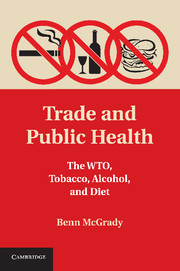Book contents
- Frontmatter
- Contents
- Preface
- Abbreviations
- 1 Intersections between Trade and Noncommunicable Disease
- 2 Normative Integration: Using Health Instruments in Interpretation of the WTO-Covered Agreements
- 3 Freedom to Use Taxes, Subsidies, and Restrictions on Marketing
- 4 Necessity and Regulatory Autonomy under the GATT
- 5 Product Regulation and Labeling Measures under the SPS and TBT Agreements
- 6 Reallocating Authority at the International Level: Delegation, Legalization, and Harmonization
- 7 Conclusion
- Glossary of Basic Trade Terms
- Bibliography
- Index
2 - Normative Integration: Using Health Instruments in Interpretation of the WTO-Covered Agreements
Published online by Cambridge University Press: 03 May 2011
- Frontmatter
- Contents
- Preface
- Abbreviations
- 1 Intersections between Trade and Noncommunicable Disease
- 2 Normative Integration: Using Health Instruments in Interpretation of the WTO-Covered Agreements
- 3 Freedom to Use Taxes, Subsidies, and Restrictions on Marketing
- 4 Necessity and Regulatory Autonomy under the GATT
- 5 Product Regulation and Labeling Measures under the SPS and TBT Agreements
- 6 Reallocating Authority at the International Level: Delegation, Legalization, and Harmonization
- 7 Conclusion
- Glossary of Basic Trade Terms
- Bibliography
- Index
Summary
Normative integration refers to a process whereby disparate norms, such as health norms and trade norms, are integrated or merged through judicial interpretation. In the context of the law of treaties, the process arguably finds its roots in the presumption against conflict. The presumption against conflict provides that treaties shall be read alongside one another unless a subsequent treaty evinces a different legislative intention to a previous treaty. In accordance with this presumption, a treaty interpreter should consider whether two treaties can be read together before considering whether one treaty should be limited in its application as a result of conflict.
The extent to which health norms are integrated into WTO law in the context of dispute settlement is a natural starting point for analysis of how WTO law applies to the new public health. Examination of the issue is a precursor to examining application of the covered agreements. The extent to which WTO law integrates international health norms is also of importance to the question of how international health instruments should be shaped so as to best interact with WTO law. For example, Tomer Broude has argued that the integration of norms in international law tends to lead to the integration of international authority, and that as a consequence, softer or less binding means of integration are less threatening influences on the allocation of authority. In accordance with this argument, nonbinding instruments may enhance the integration of health norms into WTO law to a greater degree than binding norms.
- Type
- Chapter
- Information
- Trade and Public HealthThe WTO, Tobacco, Alcohol, and Diet, pp. 34 - 79Publisher: Cambridge University PressPrint publication year: 2011



